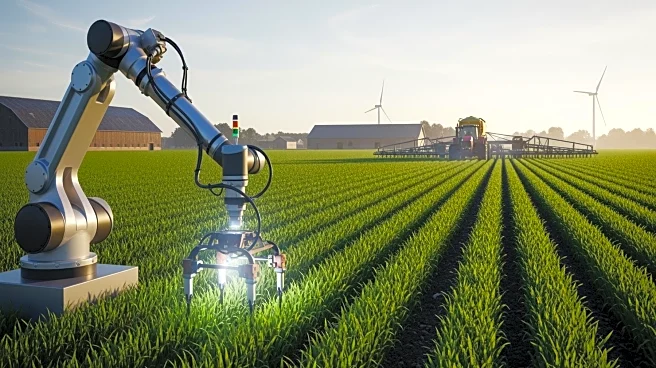What's Happening?
Robotic technologies are transforming modern agriculture by integrating advanced sensors, artificial intelligence (AI), and machine learning (ML) to manage core tasks such as planting, monitoring, weeding, harvesting, and resource allocation. These technologies are designed
to optimize productivity and sustainability, addressing challenges like labor shortages, climate stress, and resource optimization. Despite rapid progress, most agricultural robots remain in early commercial or pilot phases, with large-scale deployment primarily occurring in high-value crop and precision-farming operations. Autonomous vehicles, drones, and sensor networks are key components of smart farming, enabling precise physical tasks and dynamic adjustments to operations.
Why It's Important?
The integration of robotics in agriculture is crucial for enhancing efficiency and precision across various farming operations. By automating tasks and collecting real-time data, these technologies help farmers make informed decisions, reduce input waste, and improve sustainability. The ability to monitor equipment performance, energy consumption, and production quality in real-time allows for predictive maintenance, reducing downtime and extending equipment life. As the demand for food security and environmental protection grows, robotic technologies position agriculture as an adaptive, resilient sector capable of thriving amid increasing demands and constraints.
What's Next?
The future of agricultural robotics lies in systems that can diagnose, plan, act, and report with minimal human intervention. Innovations such as robotic swarms hold the potential to bring significant efficiencies to large and diverse farms. These systems will connect with sustainability efforts, ensuring responsible use of resources and supporting eco-labels. Regulatory frameworks and education initiatives will continue to modernize the agricultural technology baseline, with human supervision remaining essential for safety validation, adaptive decision-making, and ethical oversight.
Beyond the Headlines
The adoption of robotics in agriculture raises ethical and legal considerations, particularly regarding data privacy and the impact on labor markets. As these technologies become more embedded in farming operations, there is a need for strong regulatory frameworks, open data standards, and inclusive training ecosystems to support farmers across all levels of digital readiness. Ensuring equitable access to these technologies is crucial for small-scale farmers and regions with limited infrastructure.


















